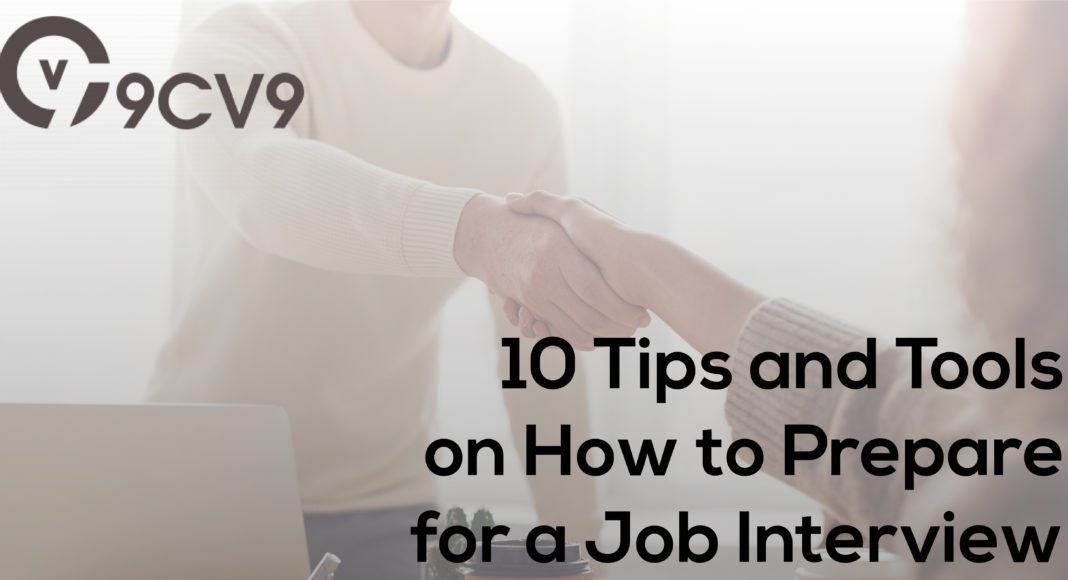So, you’ve made your CV/Resume. You’ve made your cover letter. Finally, after a long wait, you’ve got the call for a job interview. Congratulations! Sorry to say, the jeopardy starts in the interview. Safe to say, there are too many people who fail on a job interview. How do we prepare ourselves for a job interview? Here are our 10 tips and tools on how to prepare for a job interview
We will discuss this into 3 separate groups:
1. Pre – Interview
2. Interview Preparations
- Practice, Practice, Practice!
- Recruit a friend to practice answering questions
- Prepare a few questions for the interviewer.
3. The Interview itself
1. Do your research
Understanding key information about the company you’re interviewing with can help you go into your interview with confidence. Using the company’s website, social media posts, and recent press releases will provide a solid understanding of the company’s goals and how your background makes you a great fit.
Pro Tip: An interviewer may ask how you perceive his company’s position in its industry, who the firm’s competitors are, what its competitive advantages are, and how it should best go forward. For this reason, avoid trying to thoroughly research a dozen different industries. Focus your job search on just a few industries instead.
2. Review some Interviews FAQ’s
If you have gone through a lot of interviews, you might notice that there is a pattern of common questions. Depending on your field of work, the might be a slight difference in common question. Pick a list and think about which questions you’re most likely to encounter, given your age and status (about to graduate, looking for a summer internship). Then prepare your answers so you won’t have to fumble for them during the actual interview.
3. Re-read the job description.
When you’re reading the job description, there is usually some expectation to on what to have and/or what to work on. Begin underlining specific skills the employer is looking for. You may even want it to be want to print it out. Think about examples from your past and current work that align with these requirements.
4. Practice, Practice, Practice!
There is no other way to word this: Practice makes perfect. Recruiters will most definitely know that you’ve been practicing or not. The first thing that recruiters will know that you’re actually passionate and hard working is by the interview. DO NOT let them down.
5. Recruit a friend to practice answering questions
Having a friend to practice is actually a great idea. You can most definitely get inputs and work on it alot when you have someone who’s there for you. It might be biased, but be objective as possible.
Get two friends and practice interviewing each other in a “round-robin”: one person acts as the observer and the “interviewee” gets feedback from both the observer and the “interviewer.” Go for four or five rounds, switching roles as you go.
6. Prepare a few questions to the interviewer.
One of the most common thing that people fail to address is to asking back to the interviewer. Employers want to hire someone who is looking for specific things in their job search and knows what they want. Otherwise, they’re going to be afraid you’ll get bored, not like the job, leave as soon as you find something better, etc.
Come to the interview with some intelligent questions for the interviewer that demonstrate your knowledge of the company as well as your serious intent. Interviewers always ask if you have any questions, and no matter what, you should have one or two ready.
A good all-purpose question would be something like: “If you could design the ideal candidate for this position from the ground up, what would he or she be like?”
7. Timing of Arrival is KEY.
When you’re applying for something that is potentially going to change your future, you really don’t want to be late. Being late is giving the impression that you’re not committed at the very start.
Arriving too early means you have more time in the lobby to get in the right headspace before you check in at the reception desk or enter the office. And it’s an easier problem than having to tell your interviewer that you are going to be late. But at the same time, arriving too early might be a hassle. If you show up more than 15 minutes early, it can lead to problems for your interviewers, which will not put them in the best mindset to deal with you.
You don’t want to arrive too early or too late. Experts agreed that arriving 15 mins early is the optimal time. It gives you and the interviewer some time to be prepared.
8. Come with a positive mind.
Nervousness, anxiety, and all of those negative thoughts will get you nowhere. Be confident, and come with a clear mind. Believe in yourself and trust in your ability. And while it’s good to be humble and honest, you always don’t want to be too shy about telling them what you’re great at and what you’ll do for them. You’re an expert in these things, so act like one.
This also includes having an attitude. No one likes a complainer, so don’t dwell on negative experiences during an interview. Nobody is perfect in this world, but giving the impression that you think you’re perfect is a sure way to fail a job interview.
9. Make it about THEM
This is something most job seekers don’t do, and is a big reason why many people fail interviews.
Most job seekers think the interview is all about themselves. The key to getting more job offers is to make your answers about the employer, too. Along with showing them your expertise, make sure you clearly show how those skills will help them in this job. Talk about how your skills fit into their job. If you don’t study the job description carefully, you can’t do any of this. So if you’re not doing this while preparing, it’s probably why you keep failing interviews.
10. Just Be Yourself, and have fun!
The Following is a Quotation from Jim Joseph, Global President of the marketing communications agency BCW
If I’m hiring, then I want to get to know you just as much as you want to impress me. If you are true to yourself, then you’ll know if it’s a fit and vice versa. The whole point of an interview is to get beyond the buzzwords of a resume and really get to know you, how you think, and how you perform — how you will fit into my organization.
So be honest, and you’re sure to have a much smoother interview — it might even help you get hired.
Extras: Don’t give up!
We’ve all been at the spot where we failed a job interview. Whether because of our lack of experience or preparation, it is only natural that people fail one way or another. And frankly, it’s okay. Take it as a learning journal and improve on your next interview.
This also includes when you truly think would be a great fit for you. Reiterate what you have to offer the company, and say that you’d like an opportunity to contribute. Whether this strategy will get you a job offer depends on the company and on you. But one thing’s for sure: If you don’t try, your chances are exactly zero. We’ve seen this approach work on numerous occasions, and we encourage you to give it that last shot.































![Writing A Good CV [6 Tips To Improve Your CV] 6 Tips To Improve Your CV](https://blog.9cv9.com/wp-content/uploads/2020/06/2020-06-02-2-100x70.png)


